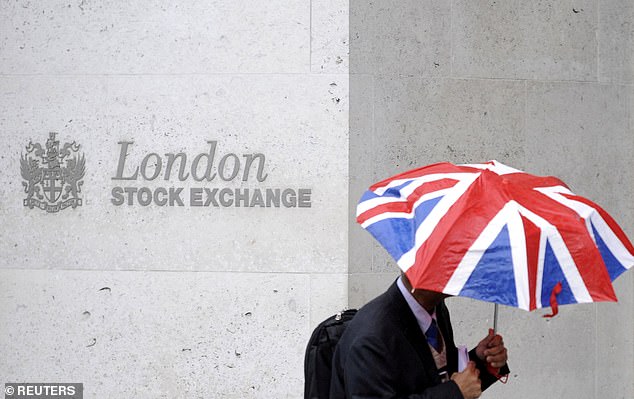Table of Contents
Investing in Britain is finally back in fashion! A day after India’s richest telecoms tycoon bought a major stake in BT, a new survey shows that the London Stock Exchange is the favourite of all European stock markets, well ahead of Germany and well ahead of France and Spain.
What’s more, the Bank of America survey says investors now view London’s top blue-chip stocks as safe bets because of their defensive nature, particularly in volatile times.
And they are right: as we have seen after the turmoil in financial markets over the past few weeks, the FTSE 100 has barely budged, while the Stoxx Europe 600 index and the US S&P 500 index have both fallen by more than 4 percent.
The survey, which covered 122 of the world’s most international investors with $265bn (£200bn) in assets, also revealed that the majority of them plan to invest in UK stocks over the next year. What a turnaround!
Trendy: The London Stock Exchange is now the favourite of all European stock markets, far ahead of Germany and well above France and Spain.
Not long ago, the same BofA survey showed that UK stocks were in shambles, largely due to the instability created by our political leaders playing musical chairs.
The paradox, of course, is that many of those same investors have missed out on some great opportunities because UK stocks have been undervalued for several years, and for no rational reason if you look at the fundamentals.
So much so. At least they are now catching up. As Simon French of Panmure Liberum asks, why have forecasters been so pessimistic about the UK when the facts point in the opposite direction?
It is true that there are many deep structural problems: low productivity, an alarmingly high number of economically inactive citizens and a huge welfare bill, to name just a few.
There have also been large fiscal and trade deficits, while taxes on investment (whether private or corporate) are too high.
Overall, however, we have proved remarkably resilient. The pound is stable, GDP growth has exceeded all estimates for two years, and household savings are solid despite recent inflation.
And as the latest figures show, unemployment is back on the decline, wage demands are cooling and mortgage rates are falling back to low levels.
It is not a bad image, especially if you compare us with Germany or France, countries that are suffering a lot.
That is why it is so galling to hear Chancellor of the Exchequer Rachel Reeves repeat her lie that Labour has inherited the worst economic outlook since the Second World War or that Liz Truss’s mini-budget wrecked the economy.
If Reeves keeps repeating this nonsense with her bossy, deputized attitude, do you think it will become reality? Why is she so irritable and bitter? It’s strange.
Before the election, Reeves had enjoyed extraordinary goodwill from business owners and the city. But that spirit is quickly dissipating.
It’s a shame, because there is much Labour could do to create the wealth Reeves supposedly craves, such as cutting share tax and reviving some form of investment relief for entrepreneurs to help create the next generation of companies like AstraZeneca, whose value has just hit £200bn.
Banking on multi-billion-pound foreign direct investment (PFI) to build a new Thames crossing or attracting private investors to join GB Energy is not going to boost the company’s engine – quite the opposite.
The right conditions need to be created – a subtle combination of stability, incentives and enthusiasm – and companies should be allowed to do the rest. It would be a shame if Reeves continued to play the “worst inheritance” card: she will end up being the one who gets the short end of the stick.
Smell of roses
How refreshing to hear Lord Rose admit he was embarrassed by Asda’s performance.
Asda’s chairman has made no secret of how poorly the retailer is doing, even suggesting co-owner Mohsin Issa should step back from running the day-to-day business.
You can understand why Rose is so honest: the latest figures from market research firm Kantar show that Asda’s sales are down 6 per cent year on year and its market share is falling.
Issa, he says, is a disruptor, “a particular horse for a particular circuit and now Asda needs a different animal.” Hmm. Is there some horseplay going on behind the scenes here that we don’t know about?
Rose is only 75. Why doesn’t she take on the role of chief executive while Asda searches for the right animal?
It sounds like he’s eager to get back on the bench.
DIY INVESTMENT PLATFORMS

AJ Bell

AJ Bell
Easy investment and ready-to-use portfolios

Hargreaves Lansdown

Hargreaves Lansdown
Free investment ideas and fund trading

interactive investor

interactive investor
Flat rate investing from £4.99 per month

Saxo

Saxo
Get £200 back in trading commissions

Trade 212

Trade 212
Free treatment and no commissions per account
Affiliate links: If you purchase a product This is Money may earn a commission. These offers are chosen by our editorial team as we believe they are worth highlighting. This does not affect our editorial independence.


